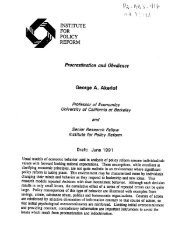Second Year (1949-1950): Toward Economic Growth ... - PDF, 101 mb
Second Year (1949-1950): Toward Economic Growth ... - PDF, 101 mb
Second Year (1949-1950): Toward Economic Growth ... - PDF, 101 mb
Create successful ePaper yourself
Turn your PDF publications into a flip-book with our unique Google optimized e-Paper software.
Emergence of the Marshall Plan<br />
have always wondered," remarked one, "if Mr.. Marshall expected the<br />
reaction that his speech received. Bevin heard of it in bed and got in<br />
touch with the Foreign Office immediately. It was astonishing the way<br />
in which he, with his elephantine frame, sprang into action. It is most<br />
important that Mr. Marshall's speech envisaged a self-help approach<br />
-not aid to down-and-ouf nations." 9 "We now realize I1?-0re clearly<br />
than then," stated another, "that the United States was going to have to<br />
get the economies of the free world going before we could stand up to<br />
Russia. This was a great political judgment. Mr. Bevin was very quick<br />
off the mark in appreciating its significance; The joint result was really<br />
a turning point in the context of what came afterward." 10<br />
French Foreign Minister Georges Bidault also reacted decisively. On<br />
June 13 he invited Bevin to discuss the proposal in Paris. The talks were<br />
soon suspended in order that Molotov might be invited to attend.<br />
On June 23 this invitation was accepted, and four days afteIward a Big<br />
Three conference opened in Paris.<br />
During the period of this session and other negotiations which followed;<br />
American representatives-including Under-Secretary Clayton,<br />
A<strong>mb</strong>assador Jefferson Caffery and Henry Labouisse in Paris and A<strong>mb</strong>assador<br />
Lewis Douglas in London-kept in close touch with the European<br />
ministers and special delegates concerned and with the State<br />
Department in Washington.<br />
The deliberations with Molotov did not last long. The British and<br />
French proposed a steering committee, composed of representatives of<br />
the Big Three and other states, to coordinate the work of subcommittees<br />
appointed to survey resources and develop the outlines of a European<br />
recovery program. The Soviets contended that such a committee would<br />
meddle in the internal affairs of sovereign nations; they presented a<br />
counterproposal that the United States be asked to specify the exact<br />
amount of help it was prepared to grant and that each country make<br />
its own surveys and estimates. The British and French governments adhered<br />
to their insistence upon a cooperative approach. When it became<br />
clear that they could not be pried from this position, the Soviet delegation<br />
withdrew.<br />
The turning point in the conference was described later to Acheson.<br />
9 "I heard later," said Acheson, "that Bevin was advised to make an inquiry to<br />
the State Department to find out whether Marshall really meant what had been<br />
said in the Harvard speech, but that. Bevin, who was very shrewd, didn't want to<br />
take the chance and preferred to go on the assumption that the statement, as made,<br />
.was fully intended." Interview cited. .<br />
10 Sir Robert L. Hall, director, <strong>Economic</strong> Section, Cabinet Planning Office. Interview,<br />
London, Nove<strong>mb</strong>er 12, 1952.

















